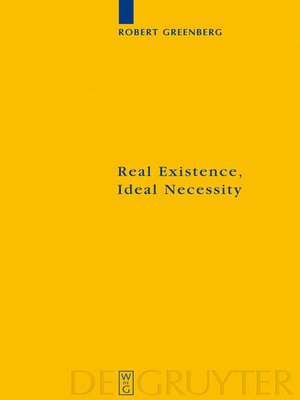Real Existence, Ideal Necessity
ebook ∣ Kant's Compromise, and the Modalities without the Compromise · Kantstudien-Ergänzungshefte
By Robert Greenberg

Sign up to save your library
With an OverDrive account, you can save your favorite libraries for at-a-glance information about availability. Find out more about OverDrive accounts.
Find this title in Libby, the library reading app by OverDrive.



Search for a digital library with this title
Title found at these libraries:
| Library Name | Distance |
|---|---|
| Loading... |
Analytic philosophy has leveled many challenges to Kant's ascription of necessary properties and relations to objects in his Critique of Pure Reason. Some of these challenges can be answered, it is argued here, largely in terms of techniques belonging to analytic philosophy itself, in particular, to its philosophy of language. This Kantian response is the primary objective of this book. It takes the form of a compromise between the real existence of the objects that we can intuit and that get our knowledge started – dubbed initiators – and the ideality of the necessary properties and relations that Kant ascribes to our sensible representations of initiators, which he entitles appearances. Whereas the real existence of initiators is independent of us and our senses, the necessity of these properties and relations of appearances is due to their origins in the mind.
The Kantian compromise between real existence and ideal necessity is formulated in terms of David Kaplan's interpretation of de re necessity in his article, "Quantifying In" – his response to Quine's concern that a commitment to such a necessity leads to an acceptance of an unwanted traditional Aristotelian essentialism.
In addition, the book first abstracts and then departs from its interpretation of Kant to provide a realistic account of the relation between existence and de re necessity.







